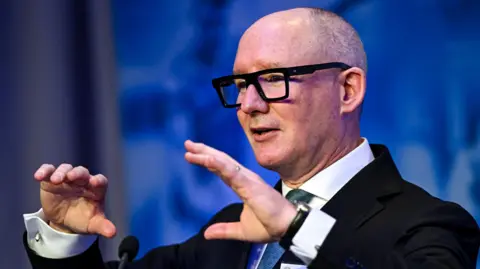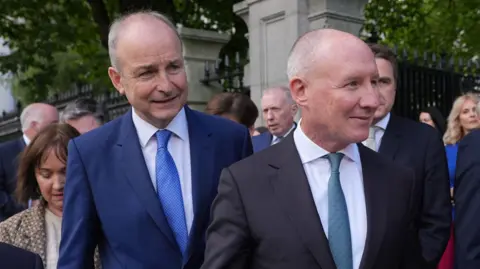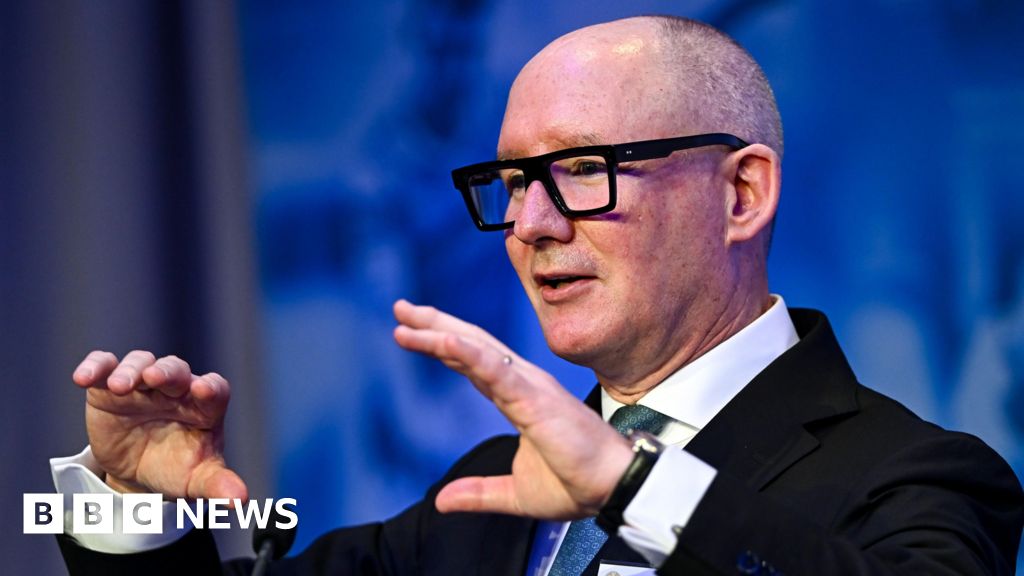 Getty Images
Getty Images
Jim Gavin defeated MEP Billy Kelleher by 41 votes to 29 in the party’s selection contest
Fianna Fáil has selected All-Ireland winning GAA manager Jim Gavin to be its candidate in the Irish presidential election next month.
Gavin defeated MEP Billy Kelleher by 41 votes to 29 in the party’s selection contest.
The taoiseach (Irish prime minister) and leader of Fianna Fáil Micheál Martin had endorsed Gavin to be the candidate last month.
He said the former Dublin manager was “the person I think best placed to represent the Irish people as president”.
Gavin, who is from Clondalkin in Dublin and who previously served in the Irish Defence Forces, was manager of the Dublin team from 2012 to 2019, when it won six All Ireland Senior Football Championship titles.
 PA Media
PA Media
Martin and Gavin (right) addressed members of the media on Tuesday
Speaking alongside the taoiseach outside Leinster House on Tuesday, Gavin said he was “delighted” and “honoured” to be the Fianna Fáil candidate.
“It’s a great honour for myself, a great honour for my family,” he said. “I’m thinking at this time of my father, Jimmy, who hails from west Clare, who was very proud of me, and indeed for my community from Dublin and the wider Gavin family.”
Gavin has also told Irish broadcaster RTÉ that he is in favour of the abolition of the Triple Lock – a rule on how Irish military can be used abroad.
The Triple Lock requires the approval of the United Nations (UN), government and Dáil (lower house of Irish parliament) for certain troop deployments.
Under existing rules, 12 members of the Irish Defence Forces can be sent on an overseas mission without triggering the lock.
The proposed change would mean removing the need for UN approval and raising to 50 the number of troops that can be deployed without sign off from the Dáil.
Earlier this year the tánaiste (Irish deputy prime minister) Simon Harris said he was in favour of the removal of the triple lock system saying it is about “sovereignty”.
Gavin told RTÉ’s Six One News that Ireland is a democratic, sovereign and independent state, which should “have the confidence as a nation in terms of the executive, the government, the Oireachtas, to make decisions where we put our troops”.
The current Irish president, Michael D Higgins, has been outspoken on his belief that Ireland should defend its neutrality.
‘Outstanding candidate’
The taoiseach said it was a good morning for Fianna Fáil, and that he has selected “an outstanding candidate”.
“He is extremely well-known throughout the country… so we’re dealing with a very competent, capable and well-known candidate,” Martin told reporters.
Former taoiseach and Fianna Fáil leader Bertie Ahern had hoped to be the party’s candidate, but he withdrew himself and was not endorsed by Micheál Martin.
People in the Republic of Ireland will head to the polls to vote on Friday 24 October.
In a letter to party members seeking their nomination, Gavin said his presidency would be “an active and positive one based on reaching out to every community at home as well as promoting and representing Ireland’s values abroad, facilitating the use of the Áras [presidential residence] for the people and promoting Ireland’s language, culture, education and enterprise to the wider world”.
He added: “My commitment to you is that I will travel to every part of the country, working alongside you and the party’s members, to promote this vision for an active presidency and to demonstrate Fianna Fáil’s resolute commitment to leading national debate”.
Who is running for president?
What is the role of the Irish president?
The president of Ireland acts as the head of state.
It is a largely ceremonial role, representing Ireland at public events at the national and international level.
Only citizens residing in the Irish Republic have the right to vote in presidential elections.
To run for the office, you have to be an Irish citizen and aged over 35.
Candidates also need the backing of either 20 members of the Oireachtas (Irish houses of parliament) or four of the 31 local authorities.
Michael D Higgins was inaugurated as the ninth president in 2011 and was re-elected in October 2018.
He is not eligible to stand again as he will have completed two full seven-year terms.
Higgins succeeded Mary McAleese, who has been the only president from Northern Ireland.


